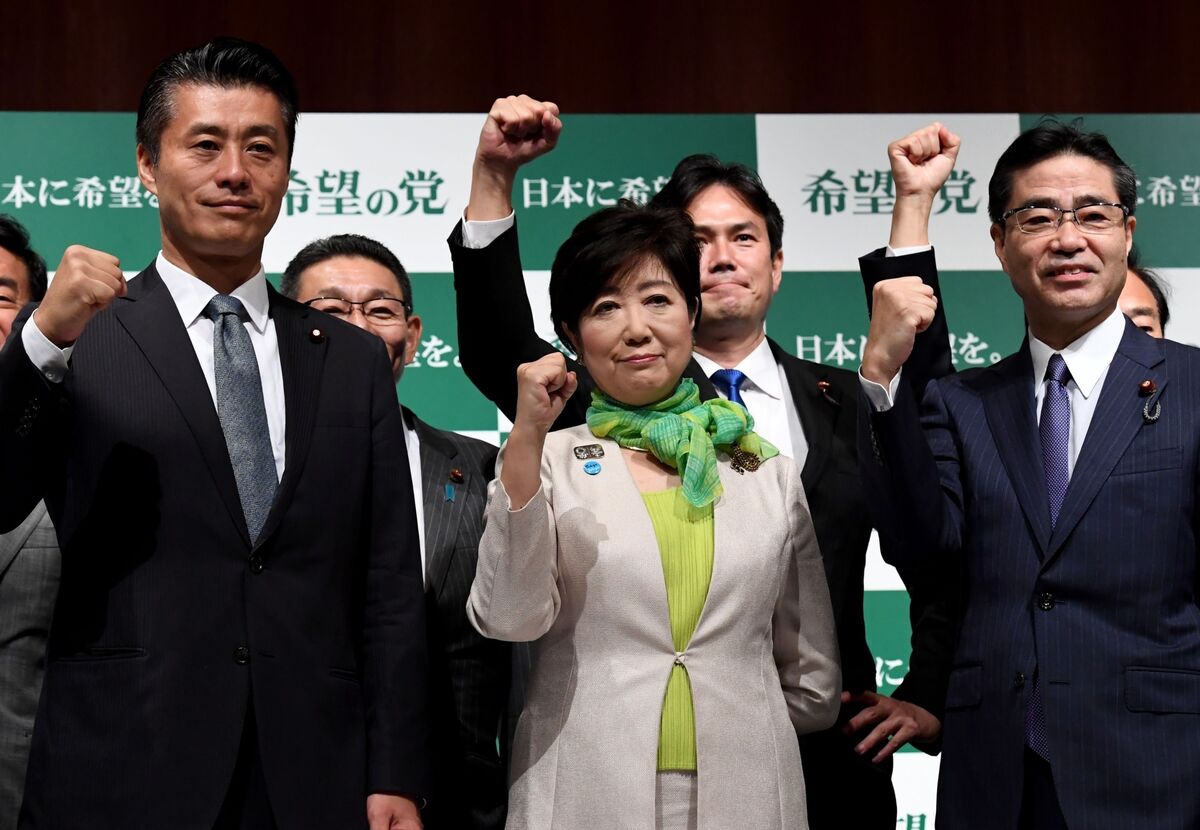
Tokyo Governor Yuriko Koike launched a new national party Wednesday, giving her less than a month to pull together a political force capable of repeating her local election victories over Prime Minister Shinzo Abe on the national stage.
Abe announced this week he would call a general election, said to be set for Oct. The sudden decision was seen as a bid to take advantage of rising voter support amid concerns over the threat from North Korea -- and to nip in the bud an expected challenge from Koike, a popular former newscaster and minister he has dubbed "a formidable opponent."
In government since 2012, Abe’s coalition has a two-thirds majority in the lower house of parliament and opinion polls show his Liberal Democratic Party’s approval rating is far higher than that of any rivals. But if Koike’s group manages to shrink his majority significantly, he will come under increased pressure to step down as party leader when his term expires next September.
"I am establishing this Party of Hope to change Japan," Koike told a packed press conference at a hotel in Tokyo. "We can change Japan because we are without fetters. And if Japan does not change, its international competitiveness and national security are at risk."
‘Flotsam and Jetsam’
A publicity video showed her walking toward a bright light, with the slogan: "Should we just put up with things, or work together to try to change them?"
Koike, who had earlier mentioned the economic risks attached to Abe’s plan to raise the unpopular sales tax in 2019, gave little further detail of her policy plans. She said she would remain in her current job while serving as party leader, rather than returning to the national parliament.
Alongside her as founder members were 14 lawmakers, many of whom have defected from parties including the LDP and the main opposition Democratic Party. The group aims to run candidates all over the country.
"They have all sorts of flotsam and jetsam," said Steven Reed, a professor of political science at Chuo University in Tokyo. "A lot depends on how good their flotsam and jetsam is. Do they have politicians with strong support groups who can win a seat?"
Previous attempts to form a third political force have quickly faded, or turned into local parties, he added.
Koike beat Abe’s candidate to win the Tokyo governorship last year, and her local party thrashed the LDP in elections for the metropolitan assembly in July.
Scrap Nuclear
The Party of Hope will aim to phase out nuclear power completely, lawmaker Shigefumi Matsuzawa said at the news conference, setting up a new battleground with Abe’s LDP, which has set a goal of having nuclear power account for as much as 22 percent of Japan’s electricity mix by 2030.
The 2011 Fukushima disaster increased unease about atomic energy in Japan. About 55 percent of Japanese oppose the restart of nuclear reactors, while 26 percent approve, according to a Mainichi newspaper poll conducted in March.
Other party lawmakers outlined plans including dealing with the shortage of daycare for children and tackling passive smoking, which has faced resistance in parliament.
Former LDP lawmaker Masaru Wakasa said the sales tax increase should be put on hold. He added that there was a need for lawmakers to make sacrifices to avoid wasteful spending, such as by cutting their numbers, which would lead to a unicameral parliament.
Since Abe announced the election, opposition parties have stepped up horsetrading over potential cooperation in the campaign to unseat him. Democratic Party leader Seiji Maehara met Koike Tuesday to discuss a potential merger, the Nikkei newspaper said, while Kyodo News reported the Communist Party would support former Democrat Shiori Yamao, who plans to run as an independent.
The ruling coalition controls about 68 percent of seats in the 475-member lower house, including 287 for the LDP and 35 for its coalition partner Komeito, according to the parliamentary website. The total number of seats is set to be cut to 465 in the next election as part of a reform aimed at reducing the excessive weight given to rural votes under the current system.
— With assistance by Stephen Stapczynski.


0 comments:
Post a Comment